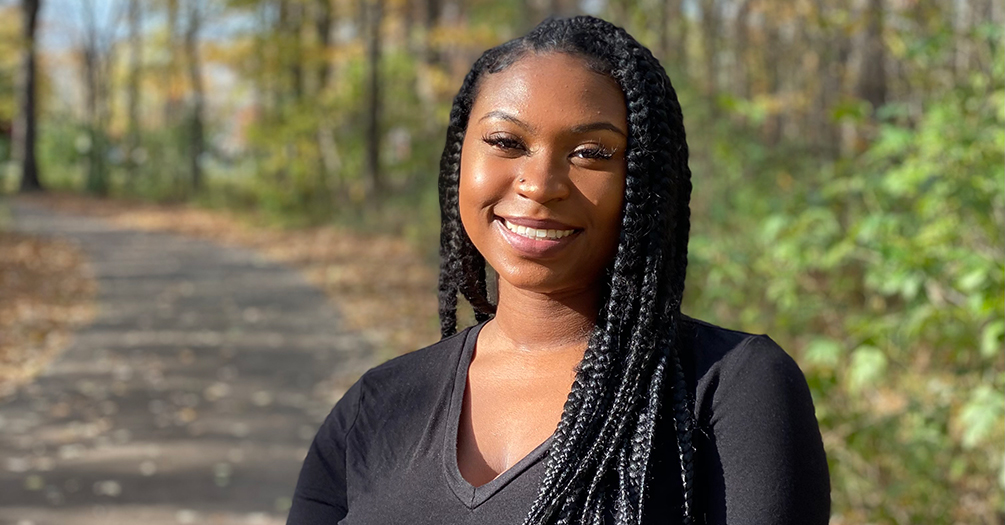Turning Experience, Knowledge, and Education into Better Public Health

Kennedy Dubose
Bachelor’s Student in Public Health
What I had experienced. My experiences growing up in Detroit’s health care system were challenging. I witnessed firsthand many of the tragic and disgusting consequences of health inequity. Many Detroiters do not have a primary care physician nor health insurance. And many neighborhoods in Detroit are food and health care deserts.
Our public health systems failed my family, other Black Detroiters, and the entire Black community in the state. It can seem as though we aren’t eligible for good health because of the cumulative health disadvantages that stack up and make it nearly impossible to live healthily.
My passion for public health is not only personal and intellectual but is driven by what I see as moral, ethical imperatives.
These unpleasant experiences across the Black community inspired me to pursue public health as a profession. With training in this field, I can address not only the health disparities and inequalities that punish Black communities but those that work against good health in a variety of minority communities.
What I didn’t know. Before coming to college, I was interested in protecting and improving the health of entire communities and populations but didn't know the field of public health existed. I thought I would accomplish my goals through the medical field. Through the university’s Health Sciences Scholars Program (HSSP), I was introduced to the field of public health. I knew immediately it was the field I'd been searching for, and while it is a broad field, it encompasses all the things I’ll need to have an impact.
I want to take care of my own community both as a local citizen and as a global citizen.
My passion for public health is not only personal and intellectual but is driven by what I see as moral, ethical imperatives. I’ve seen the consequences of preventable health inequities firsthand. My calling now—my way of restoring justice to my community and oppressed communities around the world—is to become a global health epidemiologist. And Michigan Public Health is providing me with the education and resources to become a leader that can accomplish just that.
What I did know. When I arrived at Michigan, I knew I wanted to study abroad. I spent my first college summer in London studying community action and multiculturalism and my second summer in Athens studying archaeology and religious traditions. Public health wasn’t central to either curriculum, but in both programs I observed and learned of the social and historical causes of health inequities that affect people in London and Athens today.
My study abroad experiences and my travel experiences while growing up have solidified my decision to pursue a career in global health. I've always felt a sense of connection with the world around me, and I want to take care of my own community both as a local citizen and as a global citizen. The two go hand in hand and inform each other.
I'm extremely interested in global health and learning about the health systems and public health infrastructure in other countries. As a global epidemiologist, I want to be able to improve population health domestically and internationally, so that we can collectively make the world a healthier, safer, better place.
What I learned most recently. Last spring I was accepted into Harvard's Summer Program in Epidemiology and Biostatistics.
The original program consisted of on-site data software bootcamp, coursework in epidemiology and biostatistics, formal lectures by Harvard faculty, and one-on-one research with a faculty member from Harvard’s epidemiology department. A week after I was accepted, the pandemic sent our world crashing down.
Flexibility and cross-team collaboration are indispensable in the pursuit of more equitable community health in Detroit and around the globe.
Our program changed dramatically but, given the circumstances and everyone’s limited resources, pivoted well to an online curriculum where I had personal mentoring time with a senior faculty member in epidemiology, virtual guest lectures with Harvard Chan researchers, and virtual training sessions about epidemiological study design, how to navigate academia, and what makes a good scientist.
I also participated virtually in another research project this summer. With Nemours Children's Health System, I worked on pediatric cancer epidemiology research. We found that race is a predictor for mortality and survival for children with renal carcinoma. After adjusting for several contributing factors—like tumor type, sociodemographic data, and social determinants of health like income and urbanity—children in racial minority communities were still more likely to die at any given time from renal carcinoma.
Our research is on its way to being published this winter, and I wouldn’t have had this opportunity without the Harvard program changing so drastically. Flexibility and cross-team collaboration are skills I’ve refined on my path to public health, and they are indispensable in the pursuit of more equitable community health in Detroit and around the globe.
- Interested in public health? Learn more here.
- Read more stories about Michigan Public Health students.
- Support research and engaged learning at the School of Public Health.
